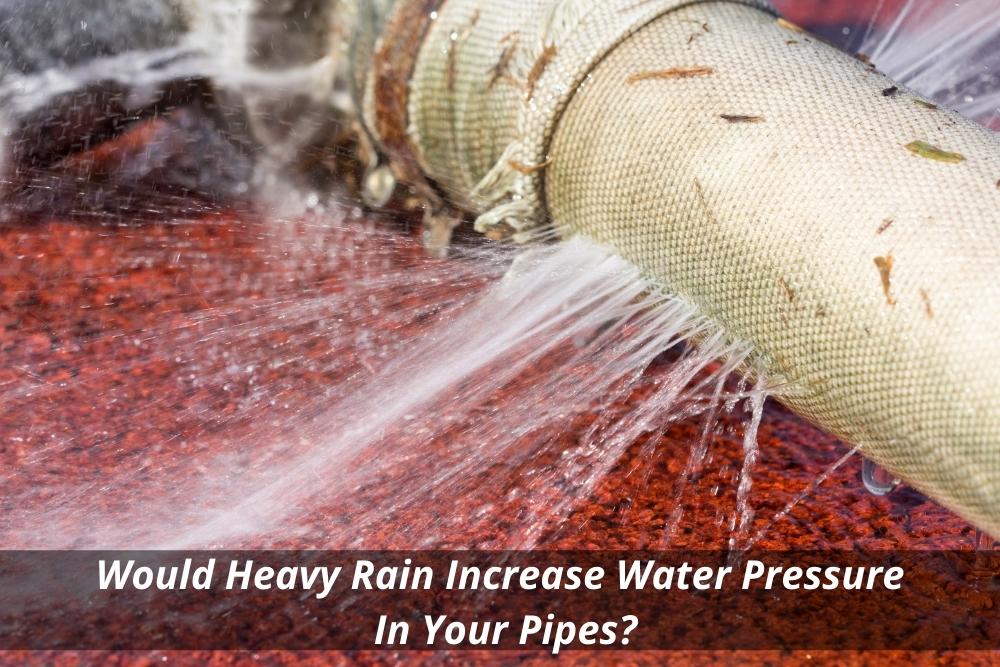Heavy rains can cause water pressure to increase in your pipes, can a backflow prevention device prevent increasing of water pressure in your pipes? This can lead to problems with your plumbing, including backflow. Backflow is when water flows backwards through your pipes and into your home. This can contaminate your drinking water and damage your home.
To prevent backflow, you should have a backflow prevention device installed in your home. Backflow prevention devices are designed to keep water from flowing backwards through your pipes. If you live in an area where heavy rains are common, you should consider installing a backflow prevention device in your home.
What is the water pressure and how is it measured?
Water pressure is the force that water exerts against the walls of pipes or against any other surface. It is usually measured in pounds per square inch (psi) or bar.
One way to measure water pressure is with a Backflow Prevention Device (BPD). This device consists of two check valves, one located at the water main and the other at the property boundary. The BPD prevents contaminated water from flowing back into the drinking water supply.
To measure the water pressure in a system, a hydrostatic test is performed. This test involves filling the piping system with water and then measuring the pressure of the water at different points within the system. The results of the hydrostatic test will show if there are any areas of the system where the water pressure is too low or too high.
If you are concerned that your water pressure may be too low or too high, you should contact a qualified plumber to have your system checked. They will be able to perform a hydrostatic test and make any necessary repairs to ensure that your water pressure is within the normal range.
How does heavy rain affect water pressure in your pipes?
Heavy rain can lead to increased water pressure in your pipes. This may cause problems with your plumbing, including backflow and leaks. Backflow is when water flows backward through your pipes and out of your faucets or fixtures.
This can contaminate your drinking water and cause damage to your home. To prevent backflow, you should install a backflow prevention valve in your home. Leaks can also occur when water pressure is too high.
To avoid leaks, you should check the pressure of your water regularly and make sure it does not exceed the maximum pressure for your piping system. If you experience any problems with your plumbing during or after a heavy rainstorm, you should contact a licensed plumber for assistance.
What can you do to prevent water pressure from increasing during a storm?
Backflow prevention devices are designed to protect your home or business from contaminated water. Backflow can occur when there is a sudden change in water pressure, causing contaminated water to flow back into your property. This can happen during a storm when water pressure increases suddenly. Backflow prevention devices are installed on your property to stop this from happening.
There are two main types of backflow prevention devices:
– Pressure Vacuum Breakers (PVBs)
– Double Check Valve Assemblies (DCVAs)
PVBs are the most common type of backflow prevention device. They work by allowing water to flow out of your property, but not back in. PVBs must be installed by a qualified plumber.
DCVAs are similar to PVBs, but they have two check valves instead of one. This means that they provide an extra level of protection against backflow. DCVAs must also be installed by a qualified plumber.
You can help prevent backflow by ensuring that your property is fitted with the appropriate backflow prevention device. If you are unsure which type of device is best for your property, you should speak to a qualified plumber. They will be able to advise you on the best course of action.
Are there any risks associated with increased water pressure in your pipes during a storm?
As storms approach, many people worry about the potential for flooding. However, increased water pressure in your pipes can also be a high hazard. If the water pressure in your pipes gets too high, it can cause them to burst. This can lead to serious damage to your home and even pose a health hazard if contaminated water is able to backflow into your home.
There are ways to prevent this from happening, however. Backflow plumbers can be installed on your piping system. These devices will ensure that water only flows in one direction, preventing it from being forced back into your home if the water pressure outside becomes too high.
If you live in an area that is prone to storms, it is important to have a backflow preventer installed. This will help to keep your home and family safe from the dangers of increased water pressure.
How can you tell if your pipes are experiencing too much pressure during a stormy weather event?
If you notice any of the following signs, it may be an indication that your pipes are under too much pressure:
– Water spraying from taps or pipes
– Leaking pipes
– Water gushing from toilets or drains
– High water bills
If you think your pipes may be under too much pressure, it’s important to contact a professional plumber as soon as possible. They will be able to assess the situation and make any necessary repairs. Backflow prevention devices can also be installed to help protect your home from future damage.
How can you tell if the increased water pressure is putting too much stress on your pipes and could lead to a break or leak?
If you have ever been in a situation where your water pressure has suddenly increased, you may have wondered if this is putting too much stress on your pipes. After all, it stands to reason that higher water pressure could lead to breaks or leaks in your plumbing.
Fortunately, there are ways to tell if the increased water pressure is putting too much stress on your pipes. One way is to check for backflow. Backflow occurs when water flows backward through your pipes and into your home. This can happen when there is a sudden increase in water pressure, and it can cause problems like flooding and water damage.
If you suspect that backflow might be an issue, you can check for signs of it around your home. Look for pooled water, wet spots on the floor, or water stains on the walls or ceiling. If you see any of these signs, it’s important to call a plumber right away. Backflow can be dangerous and should be fixed as soon as possible.
Another way to tell if the increased water pressure is putting too much stress on your pipes is to listen to strange sounds coming from your plumbing. This could be anything from a high-pitched whistling noise to a loud banging sound. These noises can indicate that there is excessive pressure in your pipes, which can lead to breaks or leaks.
If you notice either of these signs, it’s important to take action right away. Turn off the main water valve to your home and then call a plumber. They will be able to assess the situation and make any necessary repairs.
If you’re not sure whether or not the increased water pressure is putting too much stress on your pipes, it’s always best to err on the side of caution and call a plumber.
Can a plumber help you if you’re experiencing problems with high water pressure in your home’s plumbing system?
If you’re experiencing problems with high water pressure in your home’s plumbing system, Sydney plumbers can help you by checking for leaks and repairing or replacing any damaged pipes. Professional Plumber can also install backflow prevention devices to help keep your water pressure from getting too high.
What are some tips for conserving water during periods of high rainfall?
During periods of high rainfall, it is important to take measures to conserve water. This is because heavy rains can lead to flooding and water shortages. Here are some tips for conserving water during periods of high rainfall:
-Install backflow preventers on all your drains and pipes. Backflow preventers block sewage and contaminated water from flowing back into your home or business, which can contaminate your drinking water.
-Collect rainwater in rain barrels or other containers. This can be used for watering plants or washing cars.
-Turn off all unnecessary water fixtures, such as hose bibs, sprinklers, and faucets.
-Do not wash clothes or dishes unless absolutely necessary. If you must wash them, do so in a tub or sink instead of using the washing machine or dishwasher.
-Take shorter showers and avoid running the water while brushing your teeth.
By following these tips, you can help conserve water during periods of high rainfall.
If you are experiencing a loss of water pressure, it is important to find the source of the leak as soon as possible. Plumbing services can help you determine where the leak is coming from and fix it quickly and efficiently.


